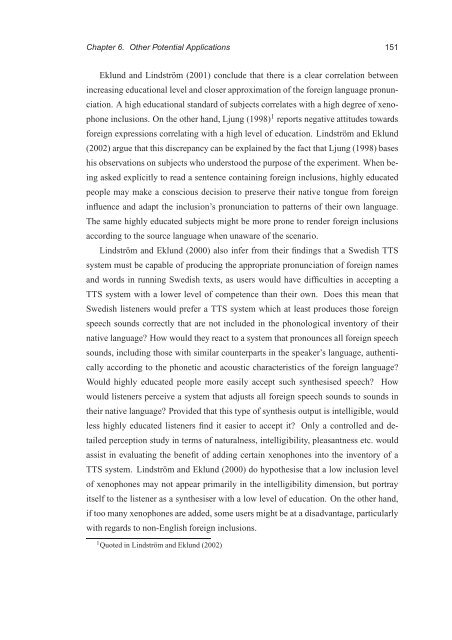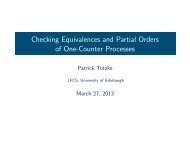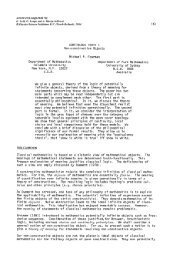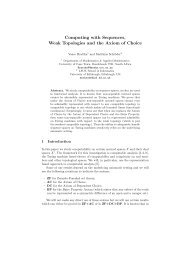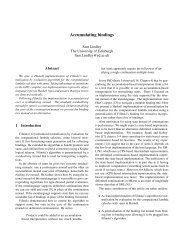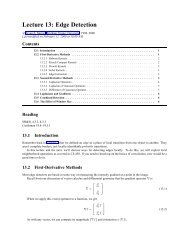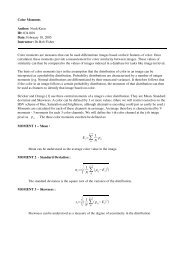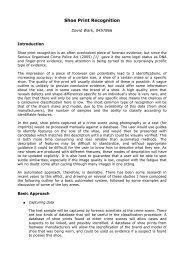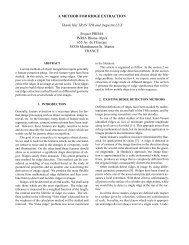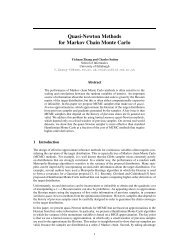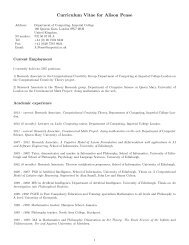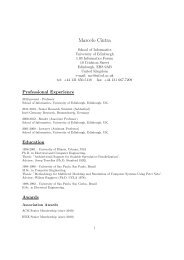PhD thesis - School of Informatics - University of Edinburgh
PhD thesis - School of Informatics - University of Edinburgh
PhD thesis - School of Informatics - University of Edinburgh
You also want an ePaper? Increase the reach of your titles
YUMPU automatically turns print PDFs into web optimized ePapers that Google loves.
Chapter 6. Other Potential Applications 151<br />
Eklund and Lindström (2001) conclude that there is a clear correlation between<br />
increasing educational level and closer approximation <strong>of</strong> the foreign language pronun-<br />
ciation. A high educational standard <strong>of</strong> subjects correlates with a high degree <strong>of</strong> xeno-<br />
phone inclusions. On the other hand, Ljung (1998) 1 reports negative attitudes towards<br />
foreign expressions correlating with a high level <strong>of</strong> education. Lindström and Eklund<br />
(2002) argue that this discrepancy can be explained by the fact that Ljung (1998) bases<br />
his observations on subjects who understood the purpose <strong>of</strong> the experiment. When be-<br />
ing asked explicitly to read a sentence containing foreign inclusions, highly educated<br />
people may make a conscious decision to preserve their native tongue from foreign<br />
influence and adapt the inclusion’s pronunciation to patterns <strong>of</strong> their own language.<br />
The same highly educated subjects might be more prone to render foreign inclusions<br />
according to the source language when unaware <strong>of</strong> the scenario.<br />
Lindström and Eklund (2000) also infer from their findings that a Swedish TTS<br />
system must be capable <strong>of</strong> producing the appropriate pronunciation <strong>of</strong> foreign names<br />
and words in running Swedish texts, as users would have difficulties in accepting a<br />
TTS system with a lower level <strong>of</strong> competence than their own. Does this mean that<br />
Swedish listeners would prefer a TTS system which at least produces those foreign<br />
speech sounds correctly that are not included in the phonological inventory <strong>of</strong> their<br />
native language? How would they react to a system that pronounces all foreign speech<br />
sounds, including those with similar counterparts in the speaker’s language, authenti-<br />
cally according to the phonetic and acoustic characteristics <strong>of</strong> the foreign language?<br />
Would highly educated people more easily accept such syn<strong>thesis</strong>ed speech? How<br />
would listeners perceive a system that adjusts all foreign speech sounds to sounds in<br />
their native language? Provided that this type <strong>of</strong> syn<strong>thesis</strong> output is intelligible, would<br />
less highly educated listeners find it easier to accept it? Only a controlled and de-<br />
tailed perception study in terms <strong>of</strong> naturalness, intelligibility, pleasantness etc. would<br />
assist in evaluating the benefit <strong>of</strong> adding certain xenophones into the inventory <strong>of</strong> a<br />
TTS system. Lindström and Eklund (2000) do hypo<strong>thesis</strong>e that a low inclusion level<br />
<strong>of</strong> xenophones may not appear primarily in the intelligibility dimension, but portray<br />
itself to the listener as a syn<strong>thesis</strong>er with a low level <strong>of</strong> education. On the other hand,<br />
if too many xenophones are added, some users might be at a disadvantage, particularly<br />
with regards to non-English foreign inclusions.<br />
1 Quoted in Lindström and Eklund (2002)


